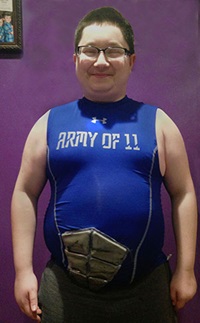Tips for sports and exercise following transplant.
 Maintaining an active and healthy lifestyle is important for everyone, but it is particularly important for transplant recipients. Boston Children’s transplant team works with each patient to set up a specifically tailored exercise plan dependent upon several factors, including the type of organ transplanted, recovery time and any other medical-related issues. Once patients have recovered from their transplant surgery, our goal is for transplant recipients to have very few restrictions when it comes to physical activity.
Maintaining an active and healthy lifestyle is important for everyone, but it is particularly important for transplant recipients. Boston Children’s transplant team works with each patient to set up a specifically tailored exercise plan dependent upon several factors, including the type of organ transplanted, recovery time and any other medical-related issues. Once patients have recovered from their transplant surgery, our goal is for transplant recipients to have very few restrictions when it comes to physical activity.
Regular exercise helps control weight, strengthens muscles and increases energy levels. The level of fitness that can be achieved is demonstrated by athletes and transplant recipients Brock and Connor Marvin, who competed in the World Transplant Games, Transplant Games of America gold medalist Alexia Clinton, and swimmer, soccer player and gymnast Phoebe Root.
Five tips for your child following transplant:
- Check in. Before beginning any sports or physical activity, check in with the transplant team.
- Keep it up. Aim for daily physical activity.
- Set realistic goals. Start slowly and increase activity gradually.

- Listen to your body. Stop exercising and contact your transplant team immediately if you experience pain, labored breathing or extreme fatigue.
- Take extra precautions. Be aware of activities that may present risk to the suppressed immune system, such as swimming in lakes, reservoirs or ponds—swim in the ocean and pools.
In addition, there are a few organ-specific instructions and restrictions:
Heart
- No high-contact, varsity-level sports (varsity boys lacrosse, varsity football, varsity hockey, varsity rugby)
- Perform a 5-10 minute warm up and cool down with all exercise
Kidney
- A Zoombang kidney protector, sewn into your sports shirt (as shown in this picture), is required for all contact sports and activities. Check with the kidney transplant program if you need more information on this.
